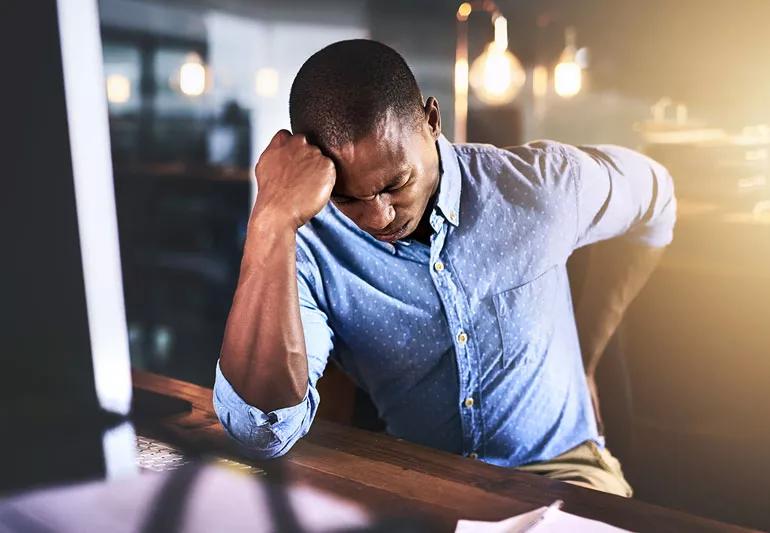A chiropractor offers guidance and simple exercises

Image content: This image is available to view online.
View image online (https://assets.clevelandclinic.org/transform/f5f7e24b-bf63-4104-bf28-ddd021e4169d/manBackPain-1142203128-770x533-1_jpg)
man at desk with back pain
Didn’t listen when your mom nagged you to sit or stand up straight? You should have. If you’re a serial sloucher, you can probably trace your neck and shoulder pain, stiffness and aching back right back to your posture.
Advertisement
Cleveland Clinic is a non-profit academic medical center. Advertising on our site helps support our mission. We do not endorse non-Cleveland Clinic products or services. Policy
Ignoring advice on good posture can affect your overall health and set you up for neck and shoulder strain, back pain and even joint damage. You may dismiss the discomfort for a while, but it’s your body’s way of getting your attention.
“Having poor posture may lead to aches and pains, but having it over the long term is when you get real damage,” says chiropractor Andrew Bang, DC.
Think of it this way: If you went to the gym and did strenuous leg exercises five days a week, your legs would feel overworked and sore. Sitting at a desk every day can bring about similar results.
Poor posture forces you to overwork the muscles in your neck and back. Your immune system’s efforts to heal those muscles spur inflammation that — over time — can lead to arthritis in nearby joints.
So, how can you tweak your habits to remedy the problem? Dr. Bang offers a few suggestions.
When you sit at your desk to work, hold your shoulders and arms at a 90-degree angle. Position your monitor straight ahead at eye level. “Most people place it so they’re looking downward, but this greatly increases neck strain,” notes Dr. Bang.
Research on “text neck” also called “tech neck” — a problem caused by constantly looking down at your phone or tablet — found that when you hold your head in line with your shoulders, it only weighs about 10 pounds.
Advertisement
“But for every inch you tilt it forward, the amount of weight it places on your spine nearly doubles,” Dr. Bang says.
Poor posture while standing prompts similar problems for your neck and back. If you have access to a standing desk at your office, that’s a comforting option. But you’ll still need to be diligent about maintaining a good posture.
Keep your spine in a neutral position. “Don’t jut your butt backward or lean too far forward,” cautions Dr. Bang. Standing in those positions can cause low back pain.
And, again, position your computer screen high enough to avoid looking downward.
Whether you sit or stand at work, Dr. Bang recommends working in regular movement.
Take a short break and walk around about once every hour if you can. But even when you’re stuck at your desk, you can vary your motion.
“Your body loves variety, so don’t allow your muscles to get too fatigued,” he says. “If you have a standing desk, you still need to move. Sway a bit, or step forward and backward for a while, throughout the day.”
Changing your daily routine can help you feel better quickly. “But making a habit of good posture may take some time,” says Dr. Bang. As with any other exercise routine, it takes about four to six weeks to see real change.
He recommends the following types of exercise to strengthen muscles to improve your posture:
If you think bad posture is causing your neck, shoulder or back pain, talk to your doctor about additional tips or therapies you can try to ease your symptoms.
Take steps to improve your posture now — you’ll be glad you did later on. (And your mom will be proud of you.)
Advertisement

Sign up for our Health Essentials emails for expert guidance on nutrition, fitness, sleep, skin care and more.
Learn more about our editorial process.
Advertisement
This common sitting position for kids can cause problems with joint health, muscle development and motor coordination
Simple exercises like wall angels and pelvic tilts can help keep your body in an optimal position — and help undo years of improper posture habits
A flexible pumping schedule, the right gear and a few smart habits can make pumping at work smoother and more successful
To avoid sleep deprivation and shift work sleep disorder, try adopting habits that minimize light exposure and prioritize daytime sleep
This behavior is usually a sign that the other person doesn’t know how to handle conflict or is prone to being passive-aggressive
Try breaking down tasks into manageable to-do lists and relying on time management techniques
It can be harder to let go when you’ve invested time, energy and emotions — but it might be the healthier choice long term
Pointing out how their behavior makes you feel and giving them projects to own can help you both
Prioritize your health by managing stress, strengthening your social connections and getting quality sleep
Bolsters, blankets, pillows and blocks can offer extra support, stability and comfort
Allergies, postnasal drip, asthma or reflux could be to blame for a cough that won’t quit